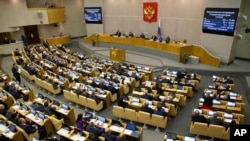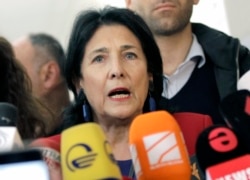This story originated in VOA's Russian Service. Story updated: July 9, 2019, 5:10 p.m.
TBILISI - Russian President Vladimir Putin says he won't support a unanimously backed parliamentary resolution to sanction neighboring Georgia, maintaining that improved ties with the former Soviet republic outweigh any response to verbal taunts by what he termed "some scumbags."
Speaking Tuesday to reporters in the Ural Mountains city of Yekaterinburg, Putin's remarks were in reference to a crude on-air verbal attack by a Georgian TV personality who on Sunday evening lambasted the Russian president in an expletive-filled rant. The diatribe drew immediate rebukes from both the Kremlin and Georgia's president.
The televised outburst followed weeks of violent anti-Russian demonstrations in the Georgian capital, Tbilisi.
Georgian President Salome Zurabishvili called on Russian legislators to ignore the "provocations of radical forces" within the central Caucasus nation and reconsider Russian Duma chairman Vyacheslav Volodin's proposed sanctions on Georgian wine, mineral water and cash remittances from Georgian migrant laborers based in Russia. The Duma is Russia's lower house of parliament.
"It would be a paradox if a neighboring state responds to the actions of those they consider to be radical forces by contributing to the realization of their destructive goals," Zurabishvili said in a statement.
"For the sake of restoring full ties, I would not do anything to complicate our relations," Putin told reporters gathered at the Global Summit on Production and Industrialization in Yekaterinburg, Russia's fourth-largest city.
"As for various types of sanctions on Georgia, I would mainly not do it out of respect for the Georgian people."
It is not clear if or how Putin's call for restraint will influence the legislative proposal.
Growing tensions
Tensions between the countries, which date back more than a decade, soured last month when protests between activists and police turned violent following the appearance of a Russian lawmaker in Georgia's parliament.
Anger over the Georgian police crackdown on the protests then triggered a series of related, daily demonstrations demanding the resignation of Interior Minister Giorgi Gakharia.
Citing risks to its citizens, the Kremlin responded to the events by suspending passenger flights to Georgia, a move that threatens to hurt its tourism sector, which hosts more than one million Russians annually.
The Georgian currency, the lari, slipped to a record low of 2.87 against the dollar on Tuesday, taking its year-to-date loss to 7.3 percent.
President Zurabishvili, who has described Russia as an enemy and occupier, warned Duma legislators that additional sanctions will only exacerbate the situation and play into the hands of people whom Moscow regards as anti-Russian zealots.
According to Kremlin spokesman Dmitry Peskov, Moscow has not yet made a judgment on sanctions, although he accused Georgian leaders of being complicit in "anti-Russian hysteria."
"... Such crude attacks are nothing more than the result of the appeasement of those who have fueled and continue to fuel anti-Russian hysteria," said Peskov.
In 2008, Georgia and Russia fought a war that claimed hundreds of lives, resulting in the Russian occupation of the Georgian regions of Abkhazia and South Ossetia and the severing of official diplomatic ties between the countries.
(( This story originated in VOA's Russian Service. (( http://www.golos-ameriki.ru/ ))






